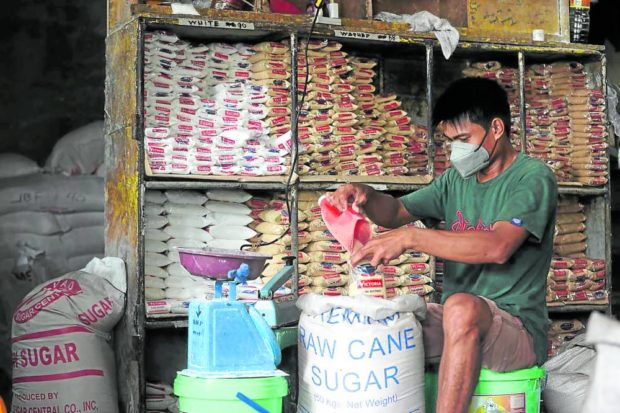House bill seeks VAT exemption for basic goods

A store helper repacks washed sugar at Tandang Sora Public Market in Quezon City. (File photo by NIÑO JESUS ORBETA / Philippine Daily Inquirer)
MANILA, Philippines — The Makabayan bloc in the House of Representatives has filed a bill seeking to exempt basic commodities — such as bread, sugar, and cooking oil — from the 12 percent value-added tax (VAT).
House Bill No. 5504, if enacted, would amend the Tax Reform Act of 1997 and include the VAT exemptions its Section 109.
The Makabayan bloc is composed of party-list lawmakers — Rep. Arlene Brosasn of Gabriela Women’s Party, Rep. Raoul Manuel of Kabataan, and Rep. France Castro of the Alliance of Concerned Teachers.
The bill specifies the following items to be excluded from VAT: “Sale or importation of basic necessities consumed on a regular basis by poor families, which include bread; canned pork, beef, fish, and other marine products; instant noodles; biscuit; sugar (raw and refined); cooking oil; salt; laundry soap; detergents; firewood; charcoal; candles and drugs classified as essential by the Department of Health.”
Brosas said that removing the VAT on these products would help consumers, especially during this time of a rising inflation rate — 6.9 percent for September, a four-year high.
Article continues after this advertisement“Removing the 12% VAT on basic goods consumed by poor families on a regular basis will dramatically ease their economic suffering amid skyrocketing prices, massive joblessness, and depressed wages,” she said.
Article continues after this advertisementShe also gave an example in Filipino: “If the price per kilogram of refined sugar is P100, for example, P12 will be deducted from this price.”
“Instead of asking consumers to control their purchases, it is the government’s responsibility to provide concrete solutions to address high prices. This should be the priority instead of pushing proposals that have nothing to do with the hunger pangs of the poor,” Brosas said, speaking in a mix of English and Filipino.”
Brosas further stated that reduced government revenues due to the VAT exemptions is not that significant compared to the amount lost for the tax reductions and perks given to large corporations.
The government would lose revenues due to the proposed VAT exemptions, she acknowledged. But she said the government could make up for it by imposing a wealth tax on the richest Filipinos.
Even in the previous 18th Congress, the Makabayan bloc had been calling for such a measure: People with over P1 billion in income would pay a 1 percent on that income. Those with over P2 billion would pay 2 percent, and those with over P3 billion, 3 percent.
According to House Bill No. 10253, which the Makabayan bloc filed in the 18th Congress, taxing the 50 richest Filipinos would yield a revenue of P236.7 billion.
The VAT was first established by Executive Order 273 in July 1987, which was issued by then-President Corazon Aquino. It was then implemented as a law — Republic Act No. 8424.
—WITH A REPORT FROM ALYSSA JOY QUEVEDO (TRAINEE)
RELATED STORIES
September inflation revs up to 6.9%
Makabayan bloc wants ‘wealth tax’ for people with over P1-B worth of assets
Tax wealth of billionaires, Makabayan bloc urges